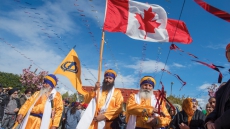Every year, on either April 13 or 14, people all across the world get together to celebrate Vaisakhi. Vaisakhi marks the Punjabi New Year as per the Nanakshahi calendar. This traditional spring harvest festival has been celebrated for centuries in Punjab and other parts of Northern India, where farmers thank God for an abundant harvest and pray for another successful one. Vaisakhi is a shared festival for people of many different cultures and religions. Individuals of all ages, ethnicities, and races come together to celebrate Vaisakhi - a day of celebration.
The Wheat Crop
The festival has a strong connection to the wheat crop. Wheat is very important in Punjab as it is the main source of income and food for most people in the region. The crop is sown around October-November and harvested in March-April. Farmers work hard all season long, and look forward to Vaisakhi. During the month of April, they harvest, sell, and store their wheat. After the harvest, farmers take a short break before getting busy with the next season.
Vaisakhi Melas
Several fairs, called melas, take place all over Punjab for people to get together and celebrate Vaisakhi. It’s a time of celebration that includes socializing, sports competitions, performances, rides for kids, and stalls filled with tasty Punjabi food. Every corner of the mela is filled with colors, mirth and laughter.

Bhangra
Bhangra is a Punjabi folk dance and a prominent symbol of Vaisakhi. After harvesting their wheat crop, farmers would attend melas where bhangra was performed. Many bhangra moves actually originate from certain farming activities, as bhangra was originally performed by farmers while they carried out agricultural chores. Therefore, the dance illustrates Punjabi culture, tradition, fashion, and even lifestyle. Bhangra is usually performed to the fast beat of a dhol. Today, this folk dance can be seen all around the world, especially in the music and film industries. Despite its evolution, bhangra remains the dance of joy, happiness, success and prosperity.

The Birth of Khalsa
Vaisakhi took on a special significance for Sikhs in 1699, when Guru Gobind Singh Ji - the tenth Sikh Guru - formally established the Khalsa Panth by baptizing the Panj Pyare (the five beloved ones). Guru ji conveyed a special message to all Sikhs and promoted the principles of Sikhism during the Vaisakhi of 1699. Sikhs come together every year on Vaisakhi to commemorate and reflect on this significant historical event and celebrate the community’s growth.
Nagar Kirtan
Vaisakhi is celebrated by Sikhs across the world by conducting Nagar Kirtans, or more commonly known as Vaisakhi parades, which involve the processional singing of holy hymns, kirtan, through the community.
Langar
Food is a big part of Vaisakhi melas and Nagar Kirtans. Every year, hundreds of people set up tents during Vaisakhi festivities to give away free food to everyone that attends. The act is a form of selfless service, sewa, which is an important concept in the Sikh religion. The first Sikh Guru, Guru Nanak Dev Ji, taught the value of sharing. Expanding on that, Guru Nanak Dev Ji also started the practice of langar, free food without discrimination of caste, religion, gender or ethnicity.


